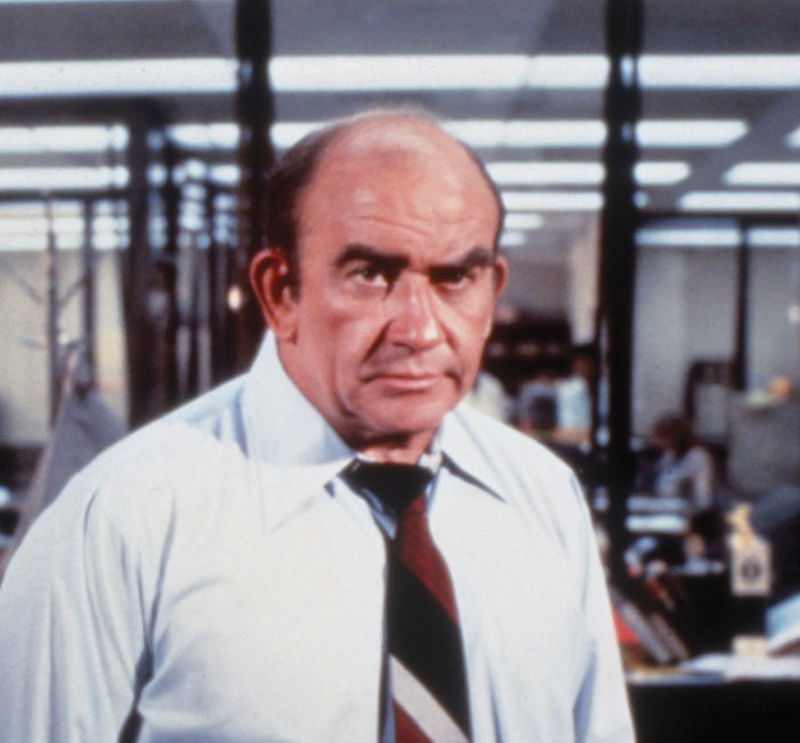The Mary Tyler Moore Show, which lasted from 1970-77, was a landmark sitcom. So strong were the writing and acting, and so vivid and true-seeming were the characters, that it spun off not only two other CBS sitcoms named after supporting characters (Rhoda, Phyllis) but also a drama based on a third, Lou Grant.
That starred Ed Asner, who had played Grant for laughs on The Mary Tyler Moore Show. A news director for the Minneapolis TV station that employed Moore’s Mary Richards, he was frumpy, cynical, gruff and foul-tempered. But he had a romantic streak that made him loveable. In his early forties, Asner was such a natural for the role that he frequently stole the show.
James L. Brooks and Allan Burns, producers of The Mary Tyler Moore Show, had a brilliant idea for Lou Grant. They moved the single Grant from Minneapolis to Los Angeles and made him city editor for a powerful daily. (They worked on the series with Gene Reynolds.)
They let the program be infused with the spirit and sense of mission of All the President’s Men, the Woodward and Bernstein account of how the Washington Post uncovered Watergate that had been turned into a hit film in 1976. But they also kept their nuanced, understated touch to portraying relationships that had been the strongest element of The Mary Tyler Moore Show.
Further, they let the show tackle controversy with strong writing that largely eschewed sensationalism. The very first episode involved L.A. police officers trying to cover up having sex with underage girls. Another episode was about an American Nazi Party leader who was secretly Jewish.
The result was a very successful hour-long drama that lasted for five seasons — 1977-82 — and won 13 Emmys during its run. It also offered one of the best Hollywood depictions ever of how a daily newspaper works, carefully and entertainingly demonstrating how such elements as deadline pressures, ego clashes and simultaneous impulses to be hurriedly reactive and slowly deliberative in covering stories all serve to unite rather than divide the staff. This newsroom feels real.
Yet, strangely, Lou Grant fell into obscurity after the show ended. It’s taken until now — the year that a film about newspaper journalism, Spotlight, won a Best Picture Oscar — for the series to get a DVD release. Shout! Factory has a five-disc package of the complete first season on the market (with just one special feature, a new interview with Asner). Season 2 is due this week; the third in November.
The first season holds up very well. There are some dated elements — Robert Walden’s Joe Rossi, the brash hot-shot reporter who is too impetuous for his own good, comes off as an excessively comic character. And the writing occasionally lets Lou pronounce something in the now-dated, lesson-learned way of old “serious” TV, as when he consoles Linda Kelsey’s reporter, Billie Newman, when she discovers her exposé of that Jewish Nazi led to his suicide.
But there’s much that rings true. Kelsey’s Newman was then and remains today a strong female character. As the smart managing editor Charlie Hume (who knew Grant previously and has hired him for the paper), Mason Adams communicates decency and even sweetness — he needs Grant to protect him from his vulnerable side.
Best of all, Nancy Marchand as the paper’s widowed owner memorably upstages Asner in the scenes they share. (And that’s not easy to do, so good is he.) Her Mrs. Pynchon sits in her office with her small dog and radiates a fluty-voiced, snobbish intimidation to anyone who dares approach her. But it slowly subsides to reveal her hard-won wisdom and protective dedication to her staff.
In one first-season episode, when the paper collects donations for a homeless family that is traveling the country scamming newspapers, Mrs. Pynchon learns the truth from her social network of other aristocratic women newspaper owners. As she delivers her revelation to Grant, she wryly prefaces it by explaining that this group’s “simple pleasure in the twilight of our lives is to control the press in major cities and wield ruthless power.”
Marchand’s Mrs. Pynchon may just be one of network television’s best supporting characters ever. And Lou Grant one of its best dramas. ©






